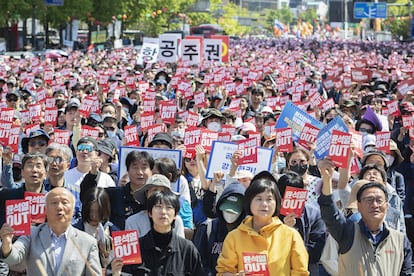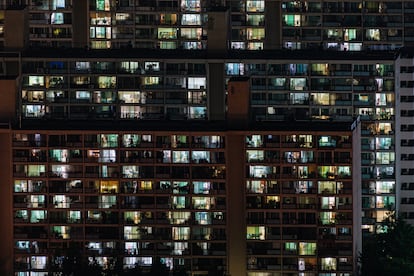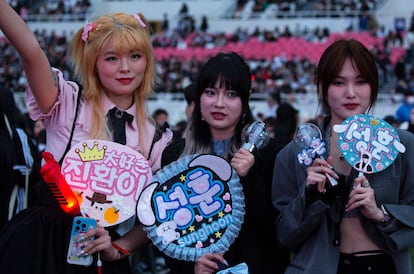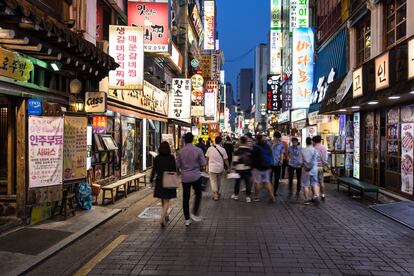Why young people in South Korea are standing up to the 14-hour work day
A government proposal to increase the working week to 69 hours was put on hold due to widespread protests, but there is concern that it still may get pushed through

In the bustling streets of Seoul — filled with food stalls (K-Food), K-Beauty centers and the sounds of K-pop — it’s evident that South Korea is a country that works nonstop. Indeed, sleep is a commodity: between the 24-hour coffee shops, there are establishments where you take an hour-long nap and specialist sleep clinics.
“We’re a bit of a coffee-addicted society,” jokes Park Mijin, 37, as he waits for a coffee at Seoulism, one of Seoul’s most Instagrammable coffee shops. It’s nearly 10 p.m. on Thursday. “Koreans are characterized by doing things quickly. This is what we call ppalli ppalli,” he says. With a broad smile, he begins to explain the concept: “Ppalli ppalli [which means “quickly” in Korean] defines the fast pace of our society. And it has its origins in the 1960s,” he says, referring to the so-called Miracle of the Han River: the industrialization and development of South Korea in the middle of the last century.
In 1953, after the Korean War, South Korea was one of the poorest nations on the planet, but seven decades later, with 51.8 million inhabitants, it is the 13th largest economy in the world by GDP, according to the International Monetary Fund (IMF). The concept of ppalli ppalli is not only linked to that historic period of growth, but also to the very foundation of the country. It had gone seemingly unquestioned. Until now.
In March, a series of protests swept across South Korea, with especially large crowds taking to the streets of Seoul, a metropolitan city home to 20 million people, and Busan, on the country’s southern coast. Together, the two cities make up more than half the population. These demonstrations — which attracted large numbers of millennials and Gen Z youngsters — were in response to a labor reform proposed by the conservative government of Yoon Suk-yeol, of the People’s Power Party (PPP).
The executive had put forward a new rule to offer companies “a solution to the difficulties in meeting deadlines.” That solution was to raise the cap on weekly working hours to 69, up from the current 52. In exchange, the government plan — which was approved by large South Korean business groups — offered workers the option of taking more time off at other times of the year and enjoying longer vacation periods. But such a proposal was deemed unrealistic given that in 2020, only four in 10 workers were able to enjoy all their days off, according to South Korea’s Ministry of Labor.

The reform was met with widespread opposition. The Korean Confederation of Trade Unions (CSC) said the rule “would make it legal to work from 9 a.m. to midnight for five days in a row. There is no consideration for the health of the employees nor for their need to rest.” Meanwhile, the Korean Women’s Associations United (KWAU) warned: “While men would work long hours, exempt from care-taking duties, women would be forced to do it all.”
Given the push and force of the protest, the South Korean government was forced to “reconsider” the labor reform. A press secretary from the conservative administration also said that it would look for ways to better communicate with the public, “especially with generation Z and millennials.”
But there is still concern that the proposal will make a comeback. “I do not trust them. I am afraid that they [the government] are going to try to approve the reform again,” says Lee Yo, a 31-year-old journalist. She is speaking from a bar near the capital’s bustling Itaewon neighborhood. She has just come from a company dinner that her boss organized and that she was “obliged” to go to — a custom she thinks is outdated.
The journalist believes that the protests against the labor reform achieved unprecedented success, but warns that the president still has wriggle room and a long term in office ahead of him: the next elections will be in 2027. Lee also thinks that generational differences are behind the conflict. “My father doesn’t think the reform is so bad,” she explains. The backlash to the reform also represents a break from ppalli ppalli culture. “We are very grateful to the previous generations for what they have done. They have built our country by putting in a lot of effort. But we don’t want to live like this,” she adds.

In 2021, South Koreans worked an average of 1,915 hours in the year, according to the Organization for Economic Cooperation and Development (OECD). That’s 199 more hours than the OECD average; and the fifth-highest figure in the rankings. In Germany, for example, the number of hours worked in 2021 was 1,349.
What’s more, lack of time is a big concern for more than half of South Koreans (54.4%), according to the 2019 Use of Time survey, which the South Korean government carries out every five years, based on interviews with some 30,000 people. In the survey, 52.2% of respondents called for reduced working hours.
Currently, the working week cannot exceed 52 hours: 40 regular working hours plus 12 more of weekly overtime. This was established by a 2018 regulation approved by the government of the center-left Democratic Party. “Before [that rule], presenteeism was much stronger,” says Park. “You couldn’t move from your chair until your superiors left.” The 2018 law also introduced company inspections and greater oversight for non-compliance.
Work-family balance
“It was a step forward that is now in jeopardy,” says Lee, in reference to the law. “Now they will try to go for 60 hours.” Lee says that working so much will make it “very difficult” to have a family. She has no children, and is not thinking about starting a family right now. Like Lee, many other South Korean women have decided that they cannot have both a family and a career, and have settled for their job. In 2022, the birth rate in South Korea was 0.78 — the lowest in the world. For the past eight years, the birth rate has been steadily falling and in 2020, South Korea recorded more deaths than births for the first time. Last year, there were 249,000 births and 372,800 deaths.
“Young Koreans have reasons for not starting a family, such as the overwhelming costs of raising children, prohibitively expensive housing, dismal job prospects, and grueling work schedules,” summarizes Hawon Jung, author of Flowers of Fire: The Inside Story of South Korea’s Feminist Movement. In her essay, she writes that “it is women who have grown tired of the impossible expectations that this traditionalist society has placed on mothers. So they’re quitting.”

During the protests against the labor reform, young people claimed that lifting the cap on the working week would increase health risks, pointing to the country’s high suicide rate, problems with stress and the phenomenon of gwarosa or “death by overwork.” Protesters also insisted that it would negatively affect South Korea’s already low birth rate, but the government did not agree that there was a connection. “The link between the reform of working hours and low birth rates lacks logical justification,” South Korean Labor Minister Lee Jung-sik posted on Twitter.
Jeong Dong, 26, is not planning on starting a family yet either. He took part in the labor reform protests and is willing to take to the streets again. At the moment, he is in the middle of his military service — in South Korea, military service of 18 to 21 months is compulsory for physically fit men aged between 18 and 35. But he’s doing office work, and is not in the field. “I was lucky,” he explains. “I got injured playing soccer, and they exempted me from training.” He can combine his military service with work, which is why he considers himself “lucky.” “This way I can save a little,” he says. The 26-year-old still lives with his parents, but wants to travel to Europe. “In Korea, work is very stressful and living is very expensive.”
Many South Koreans share his opinion. Last year, the Korean Institute for Health and Social Affairs (KIihasa) surveyed 22,000 people about work-life balance. When asked how many hours they would like to work, the average respondent replied 36.7 hours a week. The study found that while older generations were happier to work longer hours, the younger a respondent was, the less time they wanted to spend working. This is a generation that does not want the ppalli ppalli lifestyle.
Sign up for our weekly newsletter to get more English-language news coverage from EL PAÍS USA Edition
Tu suscripción se está usando en otro dispositivo
¿Quieres añadir otro usuario a tu suscripción?
Si continúas leyendo en este dispositivo, no se podrá leer en el otro.
FlechaTu suscripción se está usando en otro dispositivo y solo puedes acceder a EL PAÍS desde un dispositivo a la vez.
Si quieres compartir tu cuenta, cambia tu suscripción a la modalidad Premium, así podrás añadir otro usuario. Cada uno accederá con su propia cuenta de email, lo que os permitirá personalizar vuestra experiencia en EL PAÍS.
¿Tienes una suscripción de empresa? Accede aquí para contratar más cuentas.
En el caso de no saber quién está usando tu cuenta, te recomendamos cambiar tu contraseña aquí.
Si decides continuar compartiendo tu cuenta, este mensaje se mostrará en tu dispositivo y en el de la otra persona que está usando tu cuenta de forma indefinida, afectando a tu experiencia de lectura. Puedes consultar aquí los términos y condiciones de la suscripción digital.









































